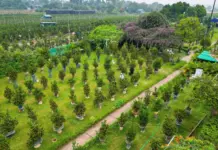Females and males in the M’nong ethnic group are distinguished by middle names such as Y, Dieu, K, H, or Thi, which means they do not know their clan.
In 2010, the province of Dak Nong initiated a scientific project to identify the surnames of M’nong people.
After several years of implementation, the project has received a positive response from the local population.
Ms. H’Oanh from Cu Jut district, Dak Nong province, said, “The identification of surnames is very meaningful to us and can prevent consanguineous marriage. In 3 villages in the district, there are many clans such as B’Krong, Ya, Ktul, Knul, Ayun, or Preng. Some surnames are identified based on geography or natural conditions.”
In Ea Tling town, over 300 people have been given surnames. Le Quang Ngoc is responsible for birth registration in Ea Tling town, Cu Jut district.
He explained, “The people are provided with detailed guidance on the surname identification process. The children are now literate, so they can assist their parents in filling out the registration form. According to local customs, the first name is written first, followed by the surname.”
Since the project was implemented in Dak Nong in 2010, more than 1,000 M’nong people have been given full names. However, the naming primarily applies to newborns and school-aged children.
Only a small number of adults have made such a change as it may affect numerous other legal documents.
Dieu Kre of Bu Bia hamlet in Dak Rlap district stated, “Each clan has a family name. We hope that the Party and state will pay more attention to our issue, even though we now have the project to identify family names for M’nong people. The main issue is that making such a change is too complicated and affects many legal documents, including family record books and certificates. My name is Ya Kre, not Dieu Kre as an example.”
The M’nong ethnic group consists of a total of 40 clans, each with its own stories, legends, geographical names, and natural phenomena.
According to Ha Thi Hanh, head of the provincial ethnic affairs department, “The department has provided guidance for the implementation of the project because, firstly, local people want to remember their origins. Secondly, the naming is beneficial for their children to attend school. Thirdly, it is important for the management of birth, marriage, and death records.”
“After evaluating the achievements and limitations, we will collaborate with the justice department to continue and expand the project to help the local population understand the importance of preserving their traditional cultural characteristics and recording their family names,” she added.
Dak Nong authorities are currently conducting a survey to gather feedback from the beneficiaries across the province in order to develop more practical solutions for implementing the project.




